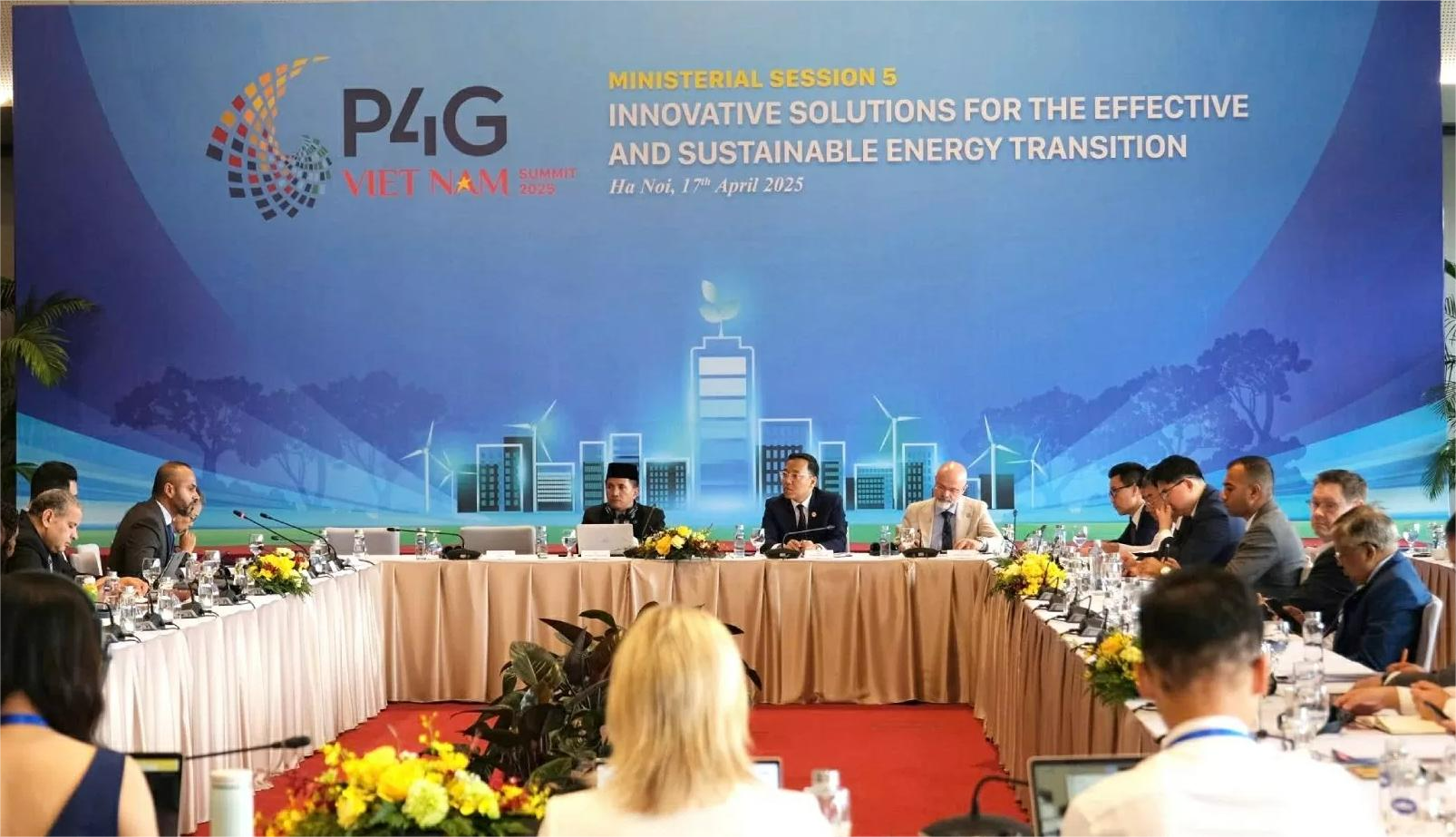Innovation-driven solutions key to Vietnam’s energy transition
 |
| A session chaired by Deputy Minister of Industry and Trade Nguyen Hoang Long |
Speaking on the April 17 event, Deputy Minister of Industry and Trade Nguyen Hoang Long stressed that energy transition is no longer a strategic choice, but an urgent global imperative.
“Vietnam considers the energy shift a national priority that must go hand-in-hand with global trends and the realities of climate change, resource depletion, and technology disruption,” he said.
He outlined three strategic directions shaping Vietnam’s approach. First is innovation, the cornerstone of technologies, such as AI-driven energy optimisation, smart grids, battery energy storage systems, and hydrogen.
“Innovation is the key to unlocking breakthroughs in energy efficiency and cost reduction,” Long noted. “But for innovation to thrive, we need stronger policies, incentives, and especially cooperation across both public and private sectors. People remain at the centre of every solution.”
Second, he underlined the need to strengthen public-private partnerships and global cooperation to scale up capital and risk-sharing mechanisms. “Mechanisms like P4G help Vietnam and other developing countries share practical experience and tap into global green finance. No single actor can go it alone.”
Third, Long reaffirmed Vietnam’s commitment to a people-centred transition, aiming to ensure equitable access to clean energy, particularly for vulnerable communities. “We believe sustainable transition must go hand-in-hand with justice. Micro-financing solutions can empower households to participate in the renewable energy shift.”
International delegates echoed these policy priorities. Indonesia’s Deputy Minister Leonardo A.A. Teguh Sambodo highlighted his country’s focus on supporting pioneering renewable energy firms, expanding green transport and bioenergy, and deploying advanced technologies like IoT-based monitoring and digital energy modelling. “We must move beyond business-as-usual models,” he said. “Technology is the foundation of a cleaner future.”
Francesco Corvaro, special envoy for climate change of Italy, shared his country’s strategy to become an energy hub for the Mediterranean region through integrated electricity grids. “Energy connections balance supply and demand, support the uptake of renewables, and enhance regional energy security,” he said. “You can’t talk about clean energy or AI without a modern, resilient grid system.”
While national strategies are being shaped at the central level and through international partnerships, local governments in Vietnam are also stepping up with clear transition plans.
Trinh Minh Hoang, Vice Chairman of Ninh Thuan People’s Committee, emphasised the province’s ambition to become a renewable energy hub.
“With our natural advantages and political will, Ninh Thuan is steadily becoming Vietnam’s renewable energy centre,” he said. The province is calling for improved pricing policies, a robust domestic carbon market, and stronger support for local energy manufacturing to boost competitiveness and implement Power Development Plan VIII effectively," Hoang said.
From the enterprise perspective, national energy giant PetroVietnam sees the transition as both a responsibility and opportunity. “We are proactively piloting offshore wind, green hydrogen, green ammonia, and carbon capture,” said deputy CEO Le Manh Cuong. “We’ve also been applying circular economy principles, like gas reuse and waste heat recovery.”
Frasers Property Vietnam echoed the urgency of building resilience in the real estate sector. “We aim to be carbon-neutral across the full life cycle – as developers, investors, and operators,” said Edwin Tan, deputy CEO.
Meanwhile, Stride CEO Andrew Fairthorne introduced a solar model that allows households and small businesses to own systems through affordable instalments. “Our model reduces upfront barriers. Solar savings can cover monthly payments, making the system essentially self-financing,” he said.
Technology providers added perspective on infrastructure enablers. Chandan Singh, country director of Hitachi Energy Vietnam, pointed to smart grid technology, electrification, and load forecasting as priorities. “AI-enabled smart grids optimise assets, enhance energy management, and enable predictive load forecasting.”
The discussion also featured insights from the United Nations. Armida Alisjahbana, executive secretary of the Economic and Social Commission for Asia-Pacific, called for broader application of innovative technologies tailored to specific contexts. She highlighted areas such as ocean energy, smart cooling, and community-based trading platforms as key to a more inclusive transition.
The variety of voices, from government ministries and provinces to global investors and technology firms, reflected how Vietnam’s energy shift is becoming a truly multi-stakeholder process. But as speakers noted, aligning these efforts under a unified and transparent roadmap remains essential.
With clear policy signals, supportive frameworks, and continued international cooperation, Vietnam is steadily positioning itself as a regional pioneer in clean and inclusive energy development.
What the stars mean:
★ Poor ★ ★ Promising ★★★ Good ★★★★ Very good ★★★★★ Exceptional
 Tag:
Tag:
Related Contents
Latest News
More News
- $100 million initiative launched to protect forests and boost rural incomes (January 30, 2026 | 15:18)
- Trung Nam-Sideros River consortium wins bid for LNG venture (January 30, 2026 | 11:16)
- Vietnam moves towards market-based fuel management with E10 rollout (January 30, 2026 | 11:10)
- Envision Energy, REE Group partner on 128MW wind projects (January 30, 2026 | 10:58)
- Vingroup consults on carbon credits for electric vehicle charging network (January 28, 2026 | 11:04)
- Bac Ai Pumped Storage Hydropower Plant to enter peak construction phase (January 27, 2026 | 08:00)
- ASEAN could scale up sustainable aviation fuel by 2050 (January 24, 2026 | 10:19)
- 64,000 hectares of sea allocated for offshore wind surveys (January 22, 2026 | 20:23)
- EVN secures financing for Quang Trach II LNG power plant (January 17, 2026 | 15:55)
- PC1 teams up with DENZAI on regional wind projects (January 16, 2026 | 21:18)





















 Mobile Version
Mobile Version